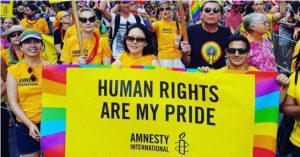LGBTI refugees increasingly unwelcome
Refugees from LGBTI backgrounds are increasingly facing discrimination and overwrought bureaucracy in host countries, advocacy groups claim.
In the US people facing anti-LGBT persecution in their home country have for the past 25 years been able to seek asylum but now they face an uphill climb proving it under the new US immigration regime.
 In the UK, LGBTQ asylum seekers applying for refuge are faced with an invasive and discriminatory interview process, activists say.
In the UK, LGBTQ asylum seekers applying for refuge are faced with an invasive and discriminatory interview process, activists say.
And across Europe there has been a rise in attacks on LGBTI asylum seekers, notably in the Netherlands.
In 2014, an investigation into the UK Home Office’s treatment of LGBTI asylum seekers was launched.
It came after a report obtained by The Observer newspaper revealed that some faced abusive and degrading interrogations about their sex lives as part of attempts to ‘prove’ their sexuality.
The outcome of the investigation led to a series of recommendations for the Home Office to help improve its treatment of LGBTI asylum seekers.
But activists say there are serious problems in our asylum system that still need to be addressed.
A recent report published by the UK Lesbian and Gay Immigration Group (UKLGIG) and other agencies found that LGBTI detainees were harassed and physically attacked by other detainees, with staff lacking the necessary training to protect them or to meet their needs.
The report also says that many are often denied access to HIV drugs and anti-depressants.
Last month an intervention by a US congressman stopped the scheduled deportation of Mexican migrant Filipe Mendoza pending his appeal to a court hearing.
Mr Mendoza came to the United States when he was eight and graduated from high school in Durham, North Carolina.
But he returned to Mexico when he could not afford college tuition in the US.
He tried to re-enter the US in 2013, then again in 2014, when he said he sought asylum on the grounds of anti-gay harassment and threats in Mexico and was allowed to stay while his claim was pending.
In an interview with media, Molina Mendoza said he went to Mexican police for help after men threw beer bottles at him and his boyfriend and he was threatened with rape.
Mexico’s Supreme Court legalized same-sex marriage in 2015.
But a report last year by the Transgender Law Center and Cornell University found anti-LGBT violence “remains pervasive through Mexico.”
The study focused on transgender women, citing 120 murders of transgender people or people who didn’t fit traditional gender expectations since same-sex marriage was allowed.
“Legal recognition of same-sex couples has increased societal awareness of the LGBT community and made LGBT people much more visible,” the report said. “Ironically, increased awareness of LGBT people appears to have produced significant backlash,” the report said.
In Australia, many LGBTI asylum seekers, particularly from Iran, have pleaded cases to be allowed to stay.
In Iran, homosexuality can be punishable by death but in most cases decisions on protection visas have not yet been made.
LGBTI groups in The Netherlands have made public calls on the government there for support in protecting LGBT asylum seekers.
This follows a gay asylum seeker from Iran sustaining serious injuries after being stabbed by a group of other asylum seekers from North Africa.
The attack happened in an asylum center in Groningen late last year.
The attacker was arrested. The victim spent five days in hospital and was then placed in another asylum center for his safety. He was reportedly moved again after running into friends of the perpetrator.
Laurie Nowell
AMES Australia Senior Journalist












